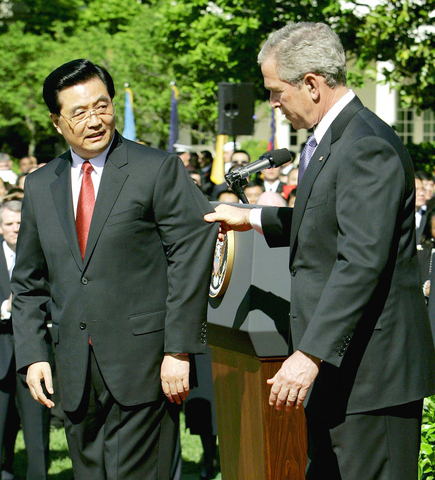Government officials yesterday welcomed US President George W Bush's reiteration of Washington's stance on Taiwan in his talks with Chinese President Hu Jintao (胡錦濤).
Bush met Hu at the White House in Washington on Thursday, where the two leaders discussed a wide range of issues including trade, human rights, nuclear proliferation and Taiwan.
"In his welcome speech on the White House's South Lawn, President Bush reiterated the US commitment to peace across the Taiwan Strait. [Bush said that] the US would uphold its `one China' policy based on the three Sino-US communiques and the Taiwan Relations Act, remained opposed to any side unilaterally changing the status quo, and that Taiwan's future must be resolved peacefully," the Foreign Ministry said in a statement.

PHOTO: EPA
"This shows that the US policy remains consistent and unchanged. This shows that the US takes the issue of peace in the Taiwan Strait seriously and remains committed to preserving that peace," the statement said.
Taiwan watched nervously as Bush and Hu held their summit at the White House, fearing that Bush might publicly criticize President Chen Shui-bian (
Although Bush did not say he was opposed to Taiwanese independence, he did say that he did not support it.
Analysts in Taiwan pointed out that Bush saying "I do not support" did not amount to a declaration of opposition.
Minister of Foreign Affairs James Huang (
Huang commented on Hu's reaction to a question from the press regarding when China would be democratized in which the Chinese president said that he didn't know the definition of "democracy."
"To most people, it's a simple question. Democracy is about people being able to choose their own leader, participate in the policy-making process and that minority opinions are respected and protected," Huang said.
Mainland Affairs Council Deputy Chairman You Ying-lung (游盈隆) said that Bush's remarks that "We [the US] believe the future of Taiwan should be resolved peacefully" dealt a severe blow to China's "Anti-secession" Law.
Premier Su Tseng-chang (蘇貞昌) said he appreciated Bush's support for Taiwan's democracy and maintaining peace across the strait.
While extending gratitude to Bush for reaffirming the US commitment to Taiwan, Democratic Progressive Party (DPP) Chairman Yu Shyi-kun criticized Hu for calling Taiwan "a part of China."
Hu "upheld the `one China' principle, excluding Taiwanese freedom to opt for independence," Yu said.
Chinese Nationalist Party (KMT) Chairman Ma Ying-jeou (馬英九) yesterday said Bush's statement on cross-strait relations was a "reiteration of the common stance shared by seven previous US presidents."
Saying the government's action on the National Unification Council had impacted on US-Taiwan relations, Ma said: "We need to be extra careful because even a seemingly insignificant act of negligence could be interpreted as changing the status quo unilaterally."
Additional reporting by Jimmy Chuang and Mo Yan-chih
Also see stories:
`Bu-Hu' meeting bedeviled by flubs
Chinese media whitewashes Hu visit
Pro-Taiwan demonstrators denounce China's buildup
Meeting with Bush only embarrassed Hu, analysts say

CHAOS: Iranians took to the streets playing celebratory music after reports of Khamenei’s death on Saturday, while mourners also gathered in Tehran yesterday Iranian Supreme Leader Ayatollah Ali Khamenei was killed in a major attack on Iran launched by Israel and the US, throwing the future of the Islamic republic into doubt and raising the risk of regional instability. Iranian state television and the state-run IRNA news agency announced the 86-year-old’s death early yesterday. US President Donald Trump said it gave Iranians their “greatest chance” to “take back” their country. The announcements came after a joint US and Israeli aerial bombardment that targeted Iranian military and governmental sites. Trump said the “heavy and pinpoint bombing” would continue through the week or as long

TRUST: The KMT said it respected the US’ timing and considerations, and hoped it would continue to honor its commitments to helping Taiwan bolster its defenses and deterrence US President Donald Trump is delaying a multibillion-dollar arms sale to Taiwan to ensure his visit to Beijing is successful, a New York Times report said. The weapons sales package has stalled in the US Department of State, the report said, citing US officials it did not identify. The White House has told agencies not to push forward ahead of Trump’s meeting with Chinese President Xi Jinping (習近平), it said. The two last month held a phone call to discuss trade and geopolitical flashpoints ahead of the summit. Xi raised the Taiwan issue and urged the US to handle arms sales to

State-run CPC Corp, Taiwan (CPC, 台灣中油) yesterday said that it had confirmed on Saturday night with its liquefied natural gas (LNG) and crude oil suppliers that shipments are proceeding as scheduled and that domestic supplies remain unaffected. The CPC yesterday announced the gasoline and diesel prices will rise by NT$0.2 and NT$0.4 per liter, respectively, starting Monday, citing Middle East tensions and blizzards in the eastern United States. CPC also iterated it has been reducing the proportion of crude oil imports from the Middle East and diversifying its supply sources in the past few years in response to geopolitical risks, expanding

Pro-democracy media tycoon Jimmy Lai’s (黎智英) fraud conviction and prison sentence were yesterday overturned by a Hong Kong court, in a surprise legal decision that comes soon after Lai was jailed for 20 years on a separate national security charge. Judges Jeremy Poon (潘兆初), Anthea Pang (彭寶琴) and Derek Pang (彭偉昌) said in the judgement that they allowed the appeal from Lai, and another defendant in the case, to proceed, as a lower court judge had “erred.” “The Court of Appeal gave them leave to appeal against their conviction, allowed their appeals, quashed the convictions and set aside the sentences,” the judges